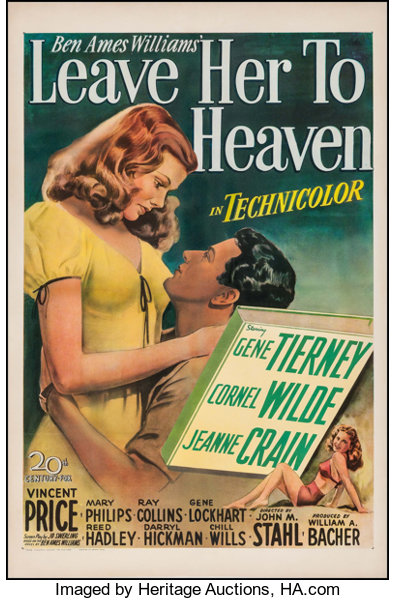
Over the years, I developed a pretty strong stomach for noir plots, and can usually watch them without blinking; since the birth of my son, though, pure, unmitigated evil, especially toward children and vulnerable people, is really trying for me. I was surprised to find the anti-heroine of Leave Her to Heaven, Ellen, so monstrous that I had to stop watching the film several times.
So much has been written about femmes fatales that I’m hardly going to innovate anything on the subject, but I did want to draw a strong parallel between Ellen and the absent protagonist of Daphne du Maurier’s Rebecca. The film is one of my favorite flicks of all time, especially because of the nightmarish Mrs. Danvers, and because Maxim fills me with ambivalence and dread. But what’s interesting about it is that the dead Rebecca is present throughout the film.
Even though Rebecca and Ellen are very different characters–Ellen is an obsessive lover (first of her father, then of Richard), whereas Rebecca is filled with contempt for Maxim, they share the scary, Hitchcock-esque characteristic of being able to put in place machinations from beyond the grave that make things unbearable for the living (there are also some Agatha Christie characters like that, especially in the short stories.) This sort of plot twist would strain credulity in the hands of less capable actresses than Gene Tierney, but she manages to introduce Ellen’s perversity so gradually that, halfway through the film, one realizes that her evil is utterly believable.
The juxtaposition of bad Ellen and good Ruth plays on a stereotype that many feminist criminologists have highlighted as a shortcoming in media representations of female crime, and it’s a steady cliché of the genre. I would have enjoyed Ruth more if she had more backbone and a bit of an edge, but films dominated by a stereotypical femme fatale seldom leave room for more than one interesting, complicated female character (this, by the way, is part of why I love Quentin Tarantino’s Kill Bill so much.) Ruth is a literary device for highlighting Ellen’s perversity. My former teachers and now colleagues Odeda Steinberg and Mimi Ajzenstadt conducted a phenomenal study a while ago, in which they examined newspaper coverage of trials of female criminals. They expected to find demonization all over, and instead they found feminization–incessant preoccupation with looks and stereotypically feminine behavior of the defendants. This may fall in line with Manheim’s chivalry theory, hints of which Malcolm Feeley and I found in the treatment of female offenders from the 19th century onward. Ellen’s conventional good looks, her athleticism and prowess, and her diabolical streak tick all the demonization/feminization boxes. As someone astutely commented on Twitter, none of this would’ve been more alarming in black and white–“the overly rich colors lend create a their own world as garish nightmare.”
Watch Leave Her to Heaven here:




No comment yet, add your voice below!